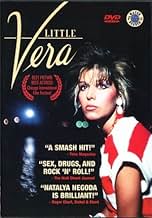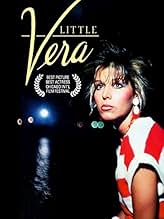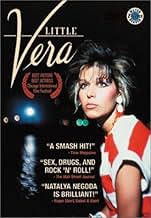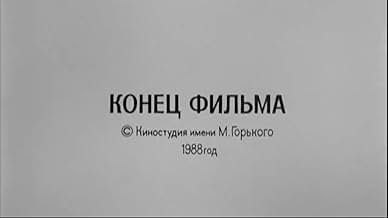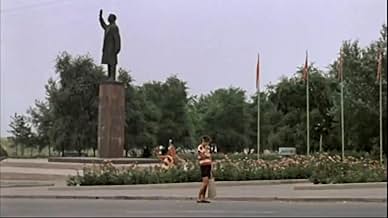NOTE IMDb
6,9/10
2,3 k
MA NOTE
Les frasques de Vera qui habite dans une petite ville industrielle. Vera a quitté l'école jeune et fait les 400 coups, suivant ses désirs afin d'oublier les disputes familiales, son père alc... Tout lireLes frasques de Vera qui habite dans une petite ville industrielle. Vera a quitté l'école jeune et fait les 400 coups, suivant ses désirs afin d'oublier les disputes familiales, son père alcoolique et le sombre avenir qui l'attend.Les frasques de Vera qui habite dans une petite ville industrielle. Vera a quitté l'école jeune et fait les 400 coups, suivant ses désirs afin d'oublier les disputes familiales, son père alcoolique et le sombre avenir qui l'attend.
- Réalisation
- Scénario
- Casting principal
- Récompenses
- 7 victoires et 9 nominations au total
Aleksandr Negreba
- Viktor - brat Very
- (as Alexander Alexseyev Negreba)
Aleksandra Tabakova
- Lenka Chistyakova
- (as Alexandra Tabakova)
Gennady Goryachev
- Sledovatel
- (as G. Goryachev)
Vadim Zakharchenko
- Muzhchina v bolnichnoy palate
- (as V. Zakharchenko)
Mariya Khmelik
- podruga Viktora
- (as M. Khmelik)
Maksim Nayrabe
- brat Lenki Chistyakovoy
- (as Maxim Nairabe)
Avis à la une
Little Vera is the story of a Russian teenager, her family, and her attempts to find meaning and value in a life sliding increasingly into decay. In her search for meaning, she falls in love with a more intellectual and rebellious Sergei, whose hatred for her deeply flawed parents quickly spirals out of control.
Little Vera is shocking and disturbing in nearly every way. The drinking of the father, the enabling and lack of understanding of the mother, the casual lies and misdirection of the brother, and Vera herself forgiving them all their flaws are all shocking and slightly disturbing to watch. However, the raw honesty of the film somehow manages to become even more shocking than the plot or characters. Set in cramped spaces and vast urban decay, Little Vera presented a vastly different view of Soviet life than had ever been seen before. In fact, Little Vera is a portrait of the collapse of Soviet society painted in shades of pain, desperation, and rust. It is the implosion of a family set against the implosion of an entire social order.
Although painful and desperately unsatisfying, the film itself is definitely worth seeing, if only to understand the feelings and cultures still reshaping Russia today.
Little Vera is shocking and disturbing in nearly every way. The drinking of the father, the enabling and lack of understanding of the mother, the casual lies and misdirection of the brother, and Vera herself forgiving them all their flaws are all shocking and slightly disturbing to watch. However, the raw honesty of the film somehow manages to become even more shocking than the plot or characters. Set in cramped spaces and vast urban decay, Little Vera presented a vastly different view of Soviet life than had ever been seen before. In fact, Little Vera is a portrait of the collapse of Soviet society painted in shades of pain, desperation, and rust. It is the implosion of a family set against the implosion of an entire social order.
Although painful and desperately unsatisfying, the film itself is definitely worth seeing, if only to understand the feelings and cultures still reshaping Russia today.
Vera is a rebellious daughter of dissatisfied proletariat parents. Her father Kolya is an alcoholic. They keep referring to her older brother Victor who is a success in Moscow. They don't like her lifestyle or her friends. She falls for Sergei and decides to marry. It raises the tension in the family. Sergei and and Kolya don't get along. Sergei starts living with the family but it doesn't go well in one violent drunken confrontation.
The film looks pretty grainy and weak compared to most indies of that time. It was sold as the first sex scene in Soviet cinema but there is nothing erotic about this movie. It is gritty, and dirty. The overbearing poverty is the backdrop. That is the more compelling aspect. The story of a rebellious daughter and family dysfunction is not necessarily original. It is somewhat new to see it portrayed about Russia at that time. The movie is filled with a downtrodden sadness and that goes for the lead actress Natalya Negoda. It's fine as a grungy indie and notable for being a Soviet film.
The film looks pretty grainy and weak compared to most indies of that time. It was sold as the first sex scene in Soviet cinema but there is nothing erotic about this movie. It is gritty, and dirty. The overbearing poverty is the backdrop. That is the more compelling aspect. The story of a rebellious daughter and family dysfunction is not necessarily original. It is somewhat new to see it portrayed about Russia at that time. The movie is filled with a downtrodden sadness and that goes for the lead actress Natalya Negoda. It's fine as a grungy indie and notable for being a Soviet film.
10fred3f
It is difficult, today and in the US, to understand this movie. We have nothing, really, to compare it with. Here is an attempt at comparison: It is as if during the last years of Saddam's rule, a filmmaker in Iraq were somehow able to make a film, which, for the first time ever, showed life as it really was lived in that country. The life of ordinary young girl, with all the terror and the repression full blown. Then the film was exhibited freely in Iraq. If you could imagine that unlikely event, then you might have an idea of what went on with this film in the last few years of the Soviet Union. Prior to this film, Soviet cinema was highly censored. Soviet movies would only show an ideal life in the worker's paradise. Then suddenly this. The alcoholism, the random sex, the ugly wasteland that was the Soviet city, the choking pollution, the proletariat victimizing each other and themselves, the utter hopelessness - it is all there. People were stunned. Soviet women would often weep during the showings. Many would say that this is the story of their lives. It was a cultural earthquake the like of which filmmakers only dream of accomplishing. It undoubtedly hastened the breakup of the Soviet Union.
Reading the reviews here, I can see that few understand this film. One says it was groundbreaking because it contained real sex. To the Soviet viewers at the time, the sex was a minor event compared to fact that it portrayed reality for the first time in Soviet cinema.
Others compare it to current films such as "As Good as it Gets" Might as well compare Homer's Illiad to the latest John Grissam novel. They simply do not compare. This is not just a film, this is was a social document, and a transforming social force. It needs to be viewed that way or you will not understand the film.
Other reviewers see it as a film about a dysfunctional Russian family. One even says that it is difficult to feel sorry for Vera because she keeps coming back to her family. The point is that Vera and her family are symbols for all of Soviet life. There was nowhere else to go, because the family down the block and in the next town were the same. This was life in the Soviet Union for most people.
This is a film that can be viewed on many levels: as a drama it traces the landscape of despair, as a social document it shows the living conditions of the time, as a political document it shows the attitude of the people and many of the reasons for the break-up of the Soviet Union, and as a moral document it shows the evils of a dictatorship that is out of control, and the cruelties that victims will practice on each other.
Little Vera clearly shows the human toll that Socialism eventually takes on its victims, despite any good intentions that system may have. In doing so it helped end the Soviet regime thus contributing to one of the major changes in modern history. This film achieves what only a few films have ever accomplished. It is not only an stunning representation of history but it also become a force in that shaped history.
Reading the reviews here, I can see that few understand this film. One says it was groundbreaking because it contained real sex. To the Soviet viewers at the time, the sex was a minor event compared to fact that it portrayed reality for the first time in Soviet cinema.
Others compare it to current films such as "As Good as it Gets" Might as well compare Homer's Illiad to the latest John Grissam novel. They simply do not compare. This is not just a film, this is was a social document, and a transforming social force. It needs to be viewed that way or you will not understand the film.
Other reviewers see it as a film about a dysfunctional Russian family. One even says that it is difficult to feel sorry for Vera because she keeps coming back to her family. The point is that Vera and her family are symbols for all of Soviet life. There was nowhere else to go, because the family down the block and in the next town were the same. This was life in the Soviet Union for most people.
This is a film that can be viewed on many levels: as a drama it traces the landscape of despair, as a social document it shows the living conditions of the time, as a political document it shows the attitude of the people and many of the reasons for the break-up of the Soviet Union, and as a moral document it shows the evils of a dictatorship that is out of control, and the cruelties that victims will practice on each other.
Little Vera clearly shows the human toll that Socialism eventually takes on its victims, despite any good intentions that system may have. In doing so it helped end the Soviet regime thus contributing to one of the major changes in modern history. This film achieves what only a few films have ever accomplished. It is not only an stunning representation of history but it also become a force in that shaped history.
What I found so interesting about this film was the incredible contrast of subject matter and mood between this film and the Russian films that came before it.
A product of Glasnost, in an attempt to modernize the cinema and remove censorship, allowed for Russians to be shown realistically and their individual stories be told instead of a happy Russian body of agreeable people.
The film addresses the reality of dysfunctional families, crammed into small apartments, alcoholism, poverty, and young adults confused and rebelling against authority.
Little Vera depicts Vera and her family with attitudes of hopelessness, apathy and loneliness.
I liked the movie for the fact that it is ground breaking showing problematic issues and stories of individuals that were never or could never be shown on screen previously under oppressive governments.
I personally wouldn't watch it again. Its worth watching once! Once was enough for me because I hated all the characters and was left depressed after watching a movie where people are constantly fighting but that- I think is the point of the film.
A product of Glasnost, in an attempt to modernize the cinema and remove censorship, allowed for Russians to be shown realistically and their individual stories be told instead of a happy Russian body of agreeable people.
The film addresses the reality of dysfunctional families, crammed into small apartments, alcoholism, poverty, and young adults confused and rebelling against authority.
Little Vera depicts Vera and her family with attitudes of hopelessness, apathy and loneliness.
I liked the movie for the fact that it is ground breaking showing problematic issues and stories of individuals that were never or could never be shown on screen previously under oppressive governments.
I personally wouldn't watch it again. Its worth watching once! Once was enough for me because I hated all the characters and was left depressed after watching a movie where people are constantly fighting but that- I think is the point of the film.
Forget every spy movie you've ever seen - this is what life was like in the USSR, and still is in many places in Russia and the ex-Soviet countries. Vera dreams of life of leisure, as she imagines the West to be; her reality is very different, with a bitter mother, a violent father, and the ever-present alcohol. And her prospects for the future are not much better. She finds a man and they try to patch up a life together, but he is afflicted by the same environment, both socially and physically - the scenery in this movie is brilliant, sitting comfortably in the company of post-apocalyptic movies but obviously done with no special effects; they have just walked in and shot whatever happened to be in front of the camera.
Forget your stereotyped, cold Russians of spy movies. This is the Real Deal: people are passionate, vibrant, and present in a way you'll never see in a drama from the West.
Forget your stereotyped, cold Russians of spy movies. This is the Real Deal: people are passionate, vibrant, and present in a way you'll never see in a drama from the West.
Le saviez-vous
- AnecdotesThis was the first Soviet film to depict graphic sexual intercourse on screen.
- Bandes originalesHeaven And Hell
(uncredited)
Written by Dieter Bohlen
Performed by C.C. Catch
Produced by Dieter Bohlen
[plays during playback of the video clip of the same name C. C. Catch]
Meilleurs choix
Connectez-vous pour évaluer et suivre la liste de favoris afin de recevoir des recommandations personnalisées
- How long is Little Vera?Alimenté par Alexa
Détails
Box-office
- Montant brut aux États-Unis et au Canada
- 1 262 598 $US
- Week-end de sortie aux États-Unis et au Canada
- 23 950 $US
- 16 avr. 1989
- Montant brut mondial
- 1 262 598 $US
Contribuer à cette page
Suggérer une modification ou ajouter du contenu manquant

